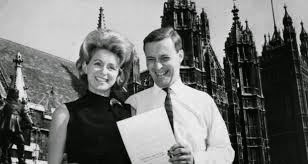Tony Benn Will and Testament’ – a documentary covering his life and political activity, including the miners’ strike and his inclusion on a new Miners’ banner.
It showed Benn narrate his personal and political life and his acceptance of his death that must have followed shortly after the film. It shows his journey through politics and his affirmation that he moved to the left through joining government and not, as everyone else does, to the right.
He explained his determination to become an MP and change the world because of an encounter with one of the Americans involved in dropping the atomic bomb on Hiroshima, eventually becoming the minister responsible for the civil nuclear programme in Britain. In this role he explained how he was completely kept in the dark about the fact that the plutonium waste used in this civil power generation was sent to supply the US nuclear weapons programme. More widely he explains that he came to realise that while in Government he didn’t have any real control and that the Labour Party became simple managers of the system when it achieved office.
The film covers many of the class struggles in Britain over the latter half of the twentieth century, from the campaign against nuclear weapons, to the Upper Clyde Shipbuilders sit-in, the ‘winter of discontent’ provoked by attacks on workers by the labour Government, the miners’ strike and the anti-Iraq war movement in our current century.
His bid for the Labour Party deputy leadership in 1981 against Denis Healy, which he very narrowly lost by barely 1%, does not get the attention it deserves but it does turn the spotlight on Neil Kinnock – the so-called left who abstained in the vote. He later became leader and was leader during the miners’ strike, which he more or less also betrayed, later being rewarded with a place in the House of Lords. A fighting leadership of the British labour movement could have made the difference between defeat and victory. Watching the film I found myself getting angrier with him than with Thatcher, but isn’t that always the way with traitors?
He brings to attention the possibility, since the 1970s, of using North Sea oil to modernise Britain but identifies the failure to do so in the pro-big business policies of Thatcher. Some on the left today see the possibility of modernising Scotland based on what’s left of North Sea oil. However they base this not on any lesson drawn from recent decades but on nationalist division. The political leader they in effect followed, Alex Salmond, proclaimed that his SNP “didn’t mind the economic side so much” of Margaret Thatcher, while claiming that “the SNP has a strong social conscience, which is very Scottish in itself.” So that puts the rest of us in our place.
I remember listening to Tony Benn speak and someone asked him about the idea that socialism could be brought about through parliament and whether the capitalist class and its system would allow such a transition without mounting a violent coup to prevent it. Ah, he said, the Chile question, referring to exactly such an attempt to introduce reform in Chile at the beginning of the 1970s, which led to the least politically interfering military in South America mounting a coup, deposing the democratically elected government of Salvador Allende and murdering thousands and thousands of workers and socialists.
Unfortunately having identified the question he didn’t give an answer to it and this might seem to be the major point to highlight in a Marxist review of a film of his political testament. And so it is. But by his own experience and through his own words he demonstrates these lessons and the film is valuable for showing them.
After recounting how he wanted to become an MP the film a few minutes later shows him speaking in the House of Commons – to row upon row of empty green benches. Having had the experience of Governmental office noted above he later announced, in a line provided by his wife, that he was leaving Parliament to spend more time in politics. We then see him on the campaign trail at meetings and demonstrations until his death this year.
So whatever his reformist words his practice in this way became the opposite of the fetishism and ‘cretinism’ of parliamentary activity for which Marxists would criticise reformist politics.
Unfortunately today , it is the so-called Marxist left who argue that the big question is the ‘crisis of working class representation’ and pursue one electoralist intervention after another, like a hamster on a wheel, going nowhere, fed on the most piss-poor politics that they otherwise condemn in other times or in other places.
So it is not just the young that could learn from these two films. Very straightforward as they are in political terms, there are basic lessons to be learnt from them – the need for unity of the oppressed, workers internationalism, the futility of seeking fundamental change through capitalist parliaments or the capitalist state, and the need for class struggle.
The defeat of the miners’ strike and the experience of social-democratic politics cast a long shadow over the working class and socialist movement today. We can learn vital lessons from them and their failure. That we do not do so is partly because we cannot see the shadow, since it is overcast by an even darker one – that of Thatcherism and the rampage of what is now called neoliberalism. To come out of the shadows we need to come out of both.
Source: Sráid Marx, An Irish Marxist Blog


No comments:
Post a Comment